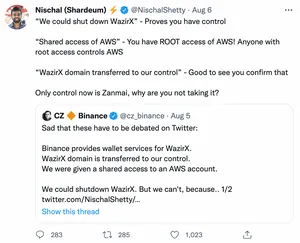The celebrities who received letters from TINA were Drake Bell, Tom Brady, DJ Khaled, Eminem, Jimmy Fallon, Paris Hilton, Eva Longoria, Madonna, Floyd Mayweather, Meek Mill, Von Miller, Neymar, Shaquille O'Neal, Gwyneth Paltrow, Logan Paul, Snoop Dogg, and Timbaland.
Truth in Advertising sends letters to 17 celebrities about undisclosed promotion of NFTs
- "TINA.org Sends Notification Letters to Celebrities Promoting NFTs", Truth in Advertising
- "Celebrities Promoting NFTs", Truth in Advertising
At least 101 NFT Discord servers compromised in July
"Animate your Bored Ape" scammers linked to more phishing attacks amounting to more than $2.5 million
- "Scammers In Paris", Investigations by ZachXBT
Tornado Cash added to U.S. sanctions list
Tornado Cash is the most prominent cryptocurrency tumbler (or "mixer") and has been used in a multitude of instances to launder proceeds from cryptocurrency hacks and scams. In a press release, the Treasury Department named the North Korea-sponsored Lazarus Group's $625 million hack of Axie Infinity in March, the $100 million theft from Horizon Bridge in June, and the $190 million hack of the Nomad bridge in August as contributing to the decision.
Although Tornado Cash had claimed to be complying with sanctions in the wake of the Axie hack, the Treasury Department wrote in their press release that, "Tornado Cash has repeatedly failed to impose effective controls designed to stop it from laundering funds for malicious cyber actors on a regular basis and without basic measures to address its risks".
Tornado Cash is also widely used to maintain privacy in a world where transactions are publicly visible, and it remains to be seen how the cryptocurrency ecosystem will react to this major development. Tornado Cash is also relatively decentralized in its operations, meaning it may be difficult for the sanctions list to be kept up to date and for the sanctions to be enforced.
The fallout from the sanction was swift: in the days following the action, Tornado's source code repository was removed from Github and the accounts of some of its developers were suspended; the project's Gitcoin funding page was taken down; and the project's own website, governance pages, and Discord server went offline.
- Specially Designated Nationals List Update, U.S. Department of the Treasury
- "U.S. Treasury Sanctions Notorious Virtual Currency Mixer Tornado Cash", U.S. Department of the Treasury
Bitcoin mining operation Riot Blockchain earns more money in July by not mining, effectively mines without paying for power
A press release from Riot proudly announced that "Riot curtailed a total of 11,717 megawatt hours in July, enough to power 13,121 average homes for one month", as though it is acceptable that they are normally using this amount of electricity solely to churn out Bitcoins.
They also wrote that "When applied to anticipated power costs for the month, the power credits and other benefits are expected to effectively eliminate Riot's power costs for July" — meaning that Texas residents are effectively subsidizing the cost of Bitcoin mining whether they like it or not. Meanwhile, the Texas Tribune and The Dallas Morning News report that many Texans are paying 50–70% more for electricity than this time last year.
Hodlnaut halts withdrawals
In an FAQ attached to the announcement, Hodlnaut told users that "it will not be a short process" to re-enable withdrawals and token swaps.
No one wants to admit to owning the WazirX crypto exchange
Despite a 2019 blog post by Binance titled, "Binance Acquires India's Leading Digital Asset Platform WazirX to Launch Multiple Fiat-to-Crypto Gateways", Binance CEO Changpeng Zhao ("CZ") tweeted that "Binance does not own any equity in Zanmai Labs, the entity operating WazirX", and that besides wallet services and an off-chain transaction integration, "WazirX is responsible all other aspects of the WazirX exchange". These statements were disputed by Nischal Shetty, the founder of WazirX, who stated in no uncertain terms that WazirX was acquired by Binance. "Binance owns WazirX domain name. Binance has root access of AWS servers. Binance has all the Crypto assets. Binance has all the Crypto profits", Shetty wrote on Twitter.
Brand new Dragoma "move-to-earn" game rug pulls for around $3.5 million
The project launched only days before it rug pulled. On August 7, the $DMA token dropped in price over 99% as funds were removed from the project and moved to exchanges. According to CoinDesk, around $3.5 million was taken. The project's website, Telegram channel, and Twitter accounts were all taken offline.
Someone makes NFTs out of photographs from the Xinjiang Victims Database
Someone apparently decided this was perfect material for an NFT project, which they named "Made In Uyghur". They took 100 images from the database, clumsily projected them onto 3D-rendered human models in a T-pose, and listed them for $25 apiece.
Upon becoming aware of the NFTs, the Xinjiang Victims Database updated their site licensing to CC BY-NC, a Creative Commons license that forbids commercial reuse. "Commercial use of the data, including images of victims, is not okay", they wrote on Twitter, "[Made In Uyghur] never contacted us about this".
"Saxon James Musk" token developer rug pulls for around $442,000
The project developer suddenly sold off their share of the coin for around 1355 WBNB (~$442,000), sending the coin price plummeting by more than 68% as a result.









